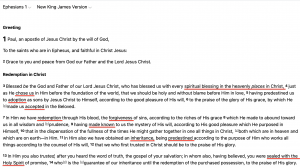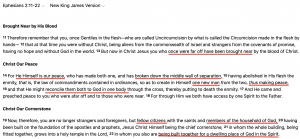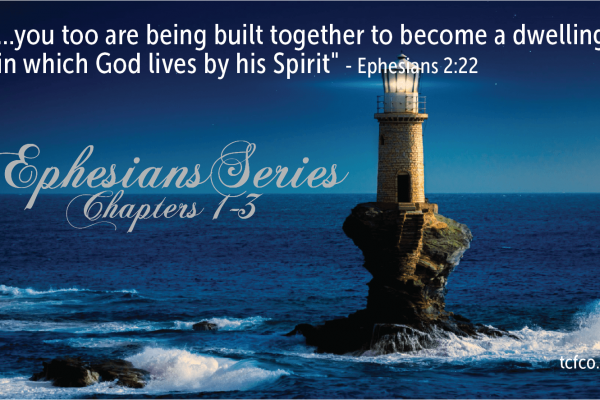1. The Great Reach Out
As discussed in the Ephesians introduction and outline, the book of Ephesians divides nicely into two sections. The first three chapters are the theological or doctrinal section. It is about our position in Christ and what God has done for us on our behalf. The latter three chapters (Ephesians 4-6) are the practical application section, or how we ought to live in light of these theological or philosophical truths and in light of what God has done for us.
We give gifts and show grace and reach out to our children and loved ones, often with whatever it takes. An ability to reach out like that is one of the greatest and deep and profound human experiences which we don’t want to miss. We want everyone we love to have such ability. It is a trait that makes a great human being or a personality. An inability to relate to another person like that is a sad state to be in – it makes a person shallow or superficial – and in some extreme cases, considered a mental disorder.
It should therefore come as no surprise that the greatest being (God) can and would reach out and give the greatest and most priceless gifts at an ultimate price. Eph 1:7 says: “In Him we have redemption through His blood, the forgiveness of sins, according to the riches of His grace”. Eph 2:13 says: “now in Christ Jesus you who once were far off have been brought near by the blood of Christ”. Luke 19:10 “For the Son of Man came to seek and to save the lost”. God also says, whoever seeks God will find God (Luke 11:9, Matthew 7:7, Proverbs 8:17, Jeremiah 29:13, Deuteronomy 4:29)
This article is a summary of the first three chapters – that is the theological or the doctrinal part.
2. Privilege and Responsibility
To get a sense of perspective, let’s begin by seeing how Paul starts the second section, the practical section. He starts chapter 4 “I urge you to live a life worthy of the calling you have received…” (Ephesians 4:1).
What is that worthy calling? In a nutshell, it is the lofty position we have as the body of Christ (also called as the church or the family of God or organs of one body with Christ as head, stones in a temple, members of one spiritual family, Christ’s presence in bodily form, etc). As we respond to the reach out and the love of God, we become part of that body and the family of God.
If we think about it, individual organs of a body do not really have an identity that is separate from the rest of the body. The liver is a vital organ but does not have an identity independent of the rest of the body or the head.
We, being described as the body of Christ shows how God treats us and the elevated position that God has placed us. However, with great privilege comes great responsibility. Being a member of the body of Christ is a great privilege, as well as a great responsibility. The responsibility is to live a life worthy of the calling.
3. Spiritual Blessings In Christ
In chapter 1 of Ephesians, Paul starts talking about our “Spiritual Blessings In Christ” (Eph 1:3). Then he lists several blessings, almost like an itemized list. The list includes:
- Adopted (Eph 1:5)
- Accepted (Eph 1:6)
- Redeemed (Eph 1:7)
- Forgiven (Eph 1:7)
- Made Known/Revealed (Eph 1:9)
- Inheritance (Eph 1:11, 18)
- Chosen (Eph 1:4,11)
- Seal of Holy spirit (Eph 1:13)
3.1 Spiritual Blessings
These are spiritual blessings. We are not talking about material blessings here. Like the beatitudes in the sermon on the mount, the kind of things Jesus says do not look like blessings in a material sense – “Blessed are those who hunger and thirst for righteousness” (Matthew 5:6), “Blessed are you when people insult you, persecute you and falsely say…” (Matthew 5:11). The rewards -“they will be children of God” (Matthew 5:9), “theirs is the kingdom of heaven” (Matthew 5:10), “they will see God” (Matthew 5:8), and so on. The rewards are spiritual or of heavenly places or the heavenly realms, as Eph 1:3 says.
3.2 In Christ
These blessings are “In Christ”. Paul uses the phrase “in Christ” at several places in his writings, and quite a lot in the book of Ephesians (about 36 times). We see at least four references to “in Christ” in the first 12 verses.
Without God, we are spiritually dead. We are attached to the life of Christ (Eph 2:5-6).
We are identified in Christ and we belong to Christ. We have these blessings because we are in Christ. To be in Christ is to be in His body (the body of Christ). We participate in His identity. We are in Christ, so we share in His exaltation, His authority, His destiny, and so forth. Things that are Christ’s blessings have become our blessings because we are in Him. The Spirit that Jesus had while on earth is now shared to the body (the church). The body is subject to the head (Christ). All those who are obedient head has the Spirit of Christ (like a container/vehicle of Christ).

3.3 Present and Future Continuum
Do we already have these blessings or is it something we will have in the future?
The answer is both. There is a continuum. The relationship with God starts now and continues in the future. We already have a relationship with God and we already experience the inner joy, peace, etc (the fruits of the Holy Spirit in us).
We already have all these blessings and we are already in a secure and lofty position, but these are still a promise of something future. Ephesians 1:13-14 says “you were sealed with the Holy Spirit of promise, who is the guarantee of our inheritance until the redemption of the purchased possession”.
It’s like having an engagement ring. Being betrothed (2 Cor 11:2), we look forward to marriage. It is like a guarantee of full realization of all these blessings in the future.
Romans 8:23 says, “we ourselves, who have the firstfruits of the Spirit, groan inwardly as we wait eagerly for our adoption to sonship, the redemption of our bodies”. Full redemption of bodies has not happened yet.
The future may have some aspects or dimensions of a spiritual realm that we may not be equipped to fully comprehend while we are still in this world, but we do have a foretaste of what it is like, which we do understand. As 1 Corinthians 13:12 says: “For now we see only a reflection as in a mirror; then we shall see face to face. Now I know in part; then I shall know fully, even as I am fully known.”
3.4 What a Healthy Source of Identity Can Do
When we have the realization that we have all these blessings, that we are valued and have an elevated position in Christ, and that we have a strong and healthy source of identity – what does it do to us?
The newfound relationship with God changes us and makes us a new person. It makes us enthralled with the person and the work of Jesus Christ and causes us to worship. We have a new life and a new community in Christ.
All behavioral problems are heart problems because we live out of the overflow of our hearts.
I am not a doctor or a psychologist, but it seems to be, that with the new life and the new community in Christ, we should not be seeing the mental health issues we often see and face – loneliness, depression, suicidal tendencies, anger issues, alcoholism, gluttony, eating disorders, narcissistic tendencies, the emptiness inside which leads to getting offended easily and in turn results in being rude, arrogant and mean towards others.
It would keep us secure, bold, confident, honest, generous and always full of hope of gratitude no matter what. It would keep us humble, without an arrogant sense of entitlement. It makes us peacemakers and people who love enemies (Luke 6:35, Matthew 5:44). It makes us better people – the kind of people one would be happy to have as a friend or a life partner or a parent or child or a colleague at work or a business partner etc – not the kind that make life miserable for themselves and everyone around them. Our families and homes will be happier places, children will grow in healthy/stable environments, our workplaces, our businesses, our community relationships will be better.
3.5 All For God’s Glory
All this is for God’s glory. As Paul explains the blessings, and he talks about our relationship to Father, and to Christ, and to Holy spirit – at the end of each, he says, “to the praise of His glory” (Eph 1:6, 1:12, 1:14) – like a poem or recurring chorus.
We have to understand that ultimately everything is for God’s glory. The gospel exists for the glory of God. We are created for the glory of God. We are saved for His glory. All this is a benefit to us but it is for His glory.
It is not glorifying to God if we are in a state without truth and if we don’t lead lives that are based on what is based on truth and what is good, right, and just. Our lives are not lived for His glory that way.
Eph 1:4 says we are chosen to be “holy and blameless before Him”. Sometimes people may understand chosenness like, that He chose us to go to heaven or something like that, but here it says that we are chosen to be holy and blameless before Him – which is to glorify Him.
Again it says in Eph 2:10, “we are God’s handiwork, created in Christ Jesus to do good works” (after clarifying in Eph 2:8 that it is only grace that we are saved). This is similar to what Jesus says in Matthew 5:16 “let your light shine before others, that they may see your good deeds and glorify your Father in heaven”.
The ultimate purpose of all this is to glorify God or for His glory.
4. Reconciliation And Unity
The net effect of the work of God in our lives is reconciliation. Reconciliation with God, reconciliation with one another.
4.1 Reconciliation with God
Paul describes a previous state (or a state before we have God), that is not desirable. Among other things, we are, “having no hope and without God” (Eph 2:12), “we were dead in trespasses” (Eph 2:5). Through God’s grace, we are reconciled with God, raised with Him, live by His life, and enjoying His presence. Eph 2:6 says “God raised us up with Christ and seated us with Him in the heavenly realms in Christ Jesus”.
4.2 Reconciliation with One Another
In a world where relationships are hard, where families are of broken or dysfunctional and there are conflicts based on race, culture, religion, language and so on, we have the answer of what brings reconciliation, restoration, justice, harmony and unity.
Our new life in Christ led to a new community/family (church). Reconciliation with one another is made possible due to the new life in the believer. 1 John 3:14 says, “We know that we have passed out of death into life, because we love the brothers. Whoever does not love abides in death”. Romans 15:7 says, “Accept one another, then, just as Christ accepted you”.
All differences are dissolved by being in Christ (Galatians 3:28). Hence there is unity and oneness even among seemingly irreconcilable groups. In Christ, there is no longer any basis of the division between people at all (whether it be racial, social, cultural, gender, language, etc).
“once were far away have been brought near” Eph 2:13
“He Himself is our peace… destroyed the barrier, the dividing wall of hostility” Eph 2:14
“one new humanity out of the two, thus making peace” Eph 2:15
“fellow citizens and members of the household of God” Eph 2:19
“Members together of one body” Eph 3:6

4.3 Wisdom and Glory of God
The creation of one new humanity and oneness among previously irreconcilable groups is described as a mystery that was not fully revealed in the past (Eph 3:6). The witness of the unity and reconciliation brought is so amazing that the world will be astonished and knows Christ through that. The unity of the church portrays the wisdom of God and the glory of God
It is a display of the “manifold wisdom of God… made known by the church” even to the “rulers and authorities in the heavenly realms” Eph 3:10.
5. Temple of God Under Construction
We know the church is not a building, not an organization, not a friendship club, not a weekly meeting with God. What then is the church? What is the temple of God?
Ephesians 2:20-22 talks about the temple of God that is being built. The whole building is joined together and rises to become a holy temple of the Lord, “a dwelling place of God in the Spirit”.
5.1 Not a Physical Building by Human Hands
In the Old Testament, God asked to build a physical temple, but that was a type and shadow – not a picture of God’s ultimate purpose. Even in the Old Testament, it was made clear. Isaiah 66:1-2 “Heaven is My throne, And earth is My footstool. Where is the house that you will build Me? And where is the place of My rest? For all those things My hand has made, And all those things exist,” Says the Lord. “But on this one will I look: On him who is poor and of a contrite spirit, And who trembles at My word”. Also, Isaiah 57:15 “I dwell in the high and holy place, and also with him who is of a contrite and lowly spirit…”.
In other words, God is saying, He inhabits people – a poor and contrived spirit – not a physical building made of hands. Stephen quotes this verse in his speech before being stoned (in Acts 7). His message is that God does not dwell in temples made with hands. God dwells in people. Wherever the people of God are, there He dwells. God is not confined to a physical temple made of stone.
John 4:21-24 we see Jesus talking to the Samaritan woman: “a time is coming when you will worship the Father neither on this mountain nor in Jerusalem… a time is coming and has now come when the true worshipers will worship the Father in the Spirit and in truth… God is spirit, and his worshipers must worship in the Spirit and in truth.”
5.2 Foundation of the Temple
Eph 2:20 says the foundation of the church is apostles (New Testament) and prophets (Old Testament). So it is legitimate only if based on the foundation of the apostles and prophets – that is, the Old Testament and the New Testament scriptures. It defines the perimeter of the foundation of the true church. There may be different denominations but the foundation has to be the on apostles and prophets.
5.3 Chief Cornerstone
Eph 2:20 says Jesus Himself is the chief cornerstone. This is alluding to Old Testament passages like Zechariah 10:4 and Psalm 118:22-23: “The stone which the builders rejected Has become the chief cornerstone”. Jesus quoted that about Himself (Matthew 21:42-43).
Isaiah 28:16 describes Jesus as both cornerstone and foundation. 1 Cor 3:10-11 describes Jesus as the foundation. So, there is some fluidity of the metaphor.
The cornerstone was always the first stone laid during construction, and every other stone in the building was measured by the standard of the cornerstone for ensuring a proper fit (sets the level and angle). It means that those who want to form the stones in the household of God or the temple of God must be conformed to the image of Christ. In other words, we must be disciples who are daily becoming more Christ-like.
5.4 Stones – We the People
Eph 2:22 says, we too “are being built together for a dwelling place of God in the Spirit”. 1 Peter 2:4-5 says: “you also, as living stones, are being built up a spiritual house, a holy priesthood, to offer up spiritual sacrifices acceptable to God through Jesus Christ”.
Individually we are the habitation of God, but Paul here talking about something corporate. The church is the temple. We are the stones. Stones are built together to make the holy temple. It is under construction. There is much work to be done, cleanup needed. More stones are being added to build the temple. It is a global phenomenon for 2000 years and counting. The building is growing and being built upon the original foundation. Someday it will be finished, will be completed and glory of God will fill the temple. It is the spiritual dwelling of God or His spiritual habitation.

5.5 Living in Light of This Reality
Being a stone in God’s temple and member of His body is a great privilege which comes a great responsibility. It is one thing to know out identity, quite an another to live in light of that reality of union with Christ. That is the challenge before us (which will be the topic of Ephesians 4-6).

